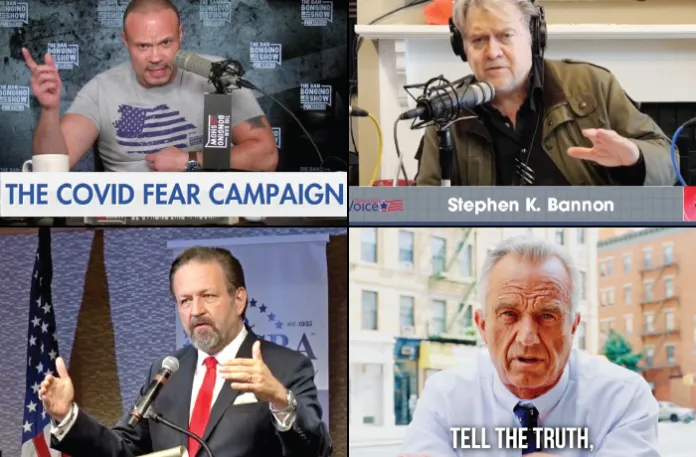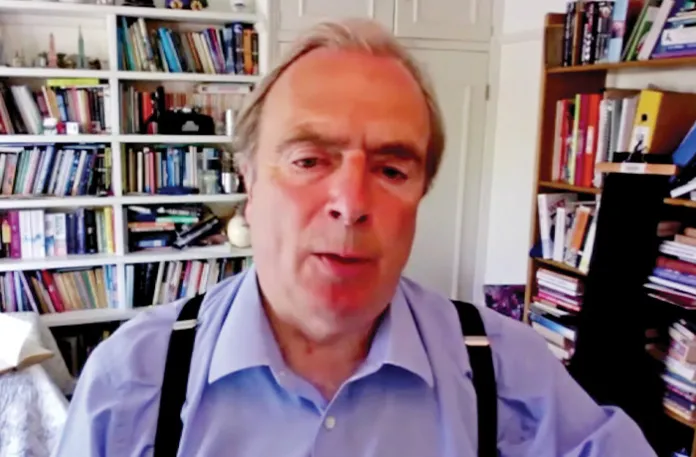Picture this: It’s a balmy June evening in 2020, and across the pond, two sharp-witted British comedians, Konstantin Kisin and Francis Foster, are wrapping up a no-holds-barred interview with the journalist Peter Hitchens. The topic was the unfolding “virus farce,” as Hitchens called it, with its endless lockdowns, mask mandates, and a societal freakout that felt more like a bad dystopian script than reality. Hitchens, ever the unflinching skeptic, didn’t mince words: The economic carnage, the shredded liberties, and the blind faith in “authorities” — it was all wildly disproportionate to the actual threat. Kisin and Foster, hosts of the podcast Triggernometry, were providing a platform that was a rare oasis for unfiltered debate in a desert of compliance.
The video drops on YouTube that night, primed to spark the kind of conversation that once defined the internet: messy, provocative, and essential. But within hours, something sinister happens. Searches for “Triggernometry Peter Hitchens” yield nothing. No recommendations, no thumbnails, no trace. It’s as if the interview vanished into the digital ether. Shadowbanned. Suppressed. Erased from the algorithm’s all-seeing eye. As Kisin recently recounted to me: “We caught them red-handed.” Not a formal takedown — no dramatic notification, no appeals process — just quiet, insidious throttling. The censors at YouTube, under the watchful gaze of their Google overlords, had deemed Hitchens’s heresy “unhelpful.” Too many questions about the science, too much doubt about the narrative. In the fevered early days of COVID-19, that was enough to trigger the invisible boot.
YouTube’s stunning reversal
Fast-forward five years to a crisp September morning in 2025, and the irony hits like a plot twist in a Tom Clancy thriller. YouTube — yes, the same platform that ghosted Hitchens’s lockdown takedown — is now bending over backward to welcome back the very voices it once exiled. In a stunning letter to House Judiciary Committee Chairman Jim Jordan (R-OH), Alphabet’s legal counsel Daniel Donovan dropped a bombshell: Thousands of accounts banned for “repeated violations” of now-defunct COVID-19 and election-integrity policies will get a shot at reinstatement. Dan Bongino, the FBI deputy director whose mask-skeptic rants once drew 3 million subscribers before the banhammer fell? Back in play. Steve Bannon, the War Room firebrand tossed for questioning the 2020 vote tallies? The door’s open. Sebastian Gorka, White House counterterrorism chief and unapologetic Trump ally? Welcome back! Even Robert F. Kennedy Jr.’s Children’s Health Defense channel, demonetized and deplatformed for vaccine skepticism, could rise from the ashes now that Kennedy helms the Department of Health and Human Services under President Donald Trump.

“YouTube values conservative voices on its platform,” Donovan writes, with all the sincerity of a politician caught in a good poll. “These creators have extensive reach and play an important role in civic discourse.” It’s a far cry from 2020, when those same voices were branded as “misinformation superspreaders” and shown the door. The pilot program, set to launch in weeks, isn’t just a policy tweak — it’s a full-throated retreat, a white flag in the war over who controls the conversation. And buried in the fine print is a jaw-dropping admission: The Biden White House didn’t just nudge Google to play ball. It pressed it — repeatedly, relentlessly — to scrub content that didn’t even violate YouTube’s rules. “Senior Biden Administration officials … conducted repeated and sustained outreach,” Donovan confesses, calling the arm-twisting “unacceptable and wrong.” Public debate, he adds, should never bow to “authorities” or third-party fact-checkers. (Google’s ditching those, too, in a nod to the pseudoscience scandals that plagued them.)
Biden’s digital overreach
This isn’t some abstract policy wonkery. It’s the vindication of every conservative who spent years screaming into the void about Big Tech’s iron fist. Remember the Hunter Biden laptop? The New York Post’s explosive drop in October 2020, throttled across platforms on whispers of “Russian disinformation” that were later proven baseless? Or the ivermectin blackouts, in which doctors’ videos touting the cheap antiparasitic as a COVID lifeline were demonetized or deleted? YouTube’s own data show over 200,000 “fact-check panels” slapped on election content alone, many flagging legit questions about voting machines and recounts as verboten. YouTube had become a chilling echo chamber in which dissent wasn’t debated — it was disappeared.

Under Democrats, censorship was a virtue — a bulwark against “disinformation,” a necessary evil to save grandma from Facebook memes. Then-President Joe Biden himself lit the fuse in July 2021, snarling at reporters: “They’re killing people” by allowing COVID “misinfo” to spread. His administration’s jawboning wasn’t subtle — it was a full-court press, with over 200 documented contacts to Google alone, per the Judiciary Committee’s investigation. Meta’s Mark Zuckerberg confessed as much last year, admitting that Biden aides pushed for more takedowns, even on non-violative content. Twitter (pre-Musk) caved, too, burying the laptop story at the FBI’s gentle urging. The result was a 2020 election shadowed by suppression and a pandemic response warped by one-sided “truth.”
The Kimmel conundrum
And now, the shoe’s firmly on the other foot, courtesy of a certain late-night host whose recent tumble from grace feels like karmic poetry. In September, as I chronicled in these pages, Jimmy Kimmel’s ABC gig hit pause after a monologue that incorrectly claimed that Charlie Kirk’s assassin was a MAGA supporter. The backlash was swift: Federal Communications Commission Chairman Brendan Carr, a Trump appointee, threatened to come after ABC “the hard way,” prompting conservatives from Sen. Ted Cruz (R-TX) to Tucker Carlson to caution against government crackdowns on free speech. Even Ben Shapiro, ever the principled provocateur, issued a timely warning: What if a Democratic FCC targeted a conservative comic? Would the free speech brigade on the Left still rally?
“The only way they’ll stop is if it happens to them,” Greg Gutfeld had said back then, prescient as ever.
Enter 2025, and oh, how the tables have turned. Kimmel’s back on air after a week’s reflection (or reckoning, depending on your side), but the Left’s outrage machine is in overdrive. Sen. Elizabeth Warren (D-MA) blasted it as “censorship reeking of corruption.” Sen. Bernie Sanders (I-VT), in a rare bipartisan flex, sided with Cruz and Sen. Rand Paul (R-KY): “The government must not censor speech.” CNN’s Jake Tapper dubbed it “the most direct infringement on free speech in my lifetime.” It’s a spectacle of selective amnesia, a masterclass in whataboutism flipped on its head.
Where were these champions of the First Amendment when Hitchens’s interview was shadowbanned into oblivion? When Bongino’s millions-strong audience was scattered to Rumble’s wilderness, forcing him to rebuild from scratch? When Bannon’s War Room, a daily drumbeat for election transparency, was silenced midfight? When popular YouTube channels like Jonathan Hogwood’s Modern Life Dating, a nonpolitical men’s self-improvement channel, were censored and suppressed merely for expressing hesitancy to rush to get the COVID shot? Crickets. Not a peep from the blue-check brigade as Biden’s digital enforcers turned YouTube into a Ministry of Truth. As Hogwood told me recently, YouTube’s suppression was “part of a broader, coordinated effort at the highest levels to silence independent voices.” The Left, then, was all in on the crackdown, cheering the bans as “protecting democracy” and nodding along as White House flacks such as Rob Flaherty bombarded tech executives with emails demanding heads on pikes — and also demanding that ivermectin posts, as well as accounts that published them, be removed immediately. In 2021, then-Surgeon General Vivek Murthy obliged, playing hall monitor to the nation.
It’s hypocrisy and a partisan flip-flop so blatant it could power a wind farm. Swap the jerseys — put a Republican in the Oval, and suddenly it’s the end of the republic. Kimmel’s suspension? An “authoritarian assault.” Trump’s FCC threats? A “mafioso shakedown.” Shapiro’s hypothetical from my Kimmel piece rings truer than ever: A Republican FCC’s pressuring of a leftist host had caused progressive Democrats to erupt with righteous indignation. Yet when a Democratic administration pressured Big Tech to silence conservative voices, the Left’s free speech warriors were nowhere to be found.
Settling scores with Silicon Valley
The plot thickened just days later, on Sept. 29, when YouTube inked a $24.5 million settlement with none other than Donald J. Trump — the man whose 2021 ban started this saga. Remember the fury? Trump’s channel, suspended indefinitely after Jan. 6 for “inciting violence,” sparked lawsuits against YouTube, Meta, and Twitter. He called it “unlawful silencing of conservative viewpoints,” a Section 230 abuse masquerading as moderation. Meta ponied up $25 million in January; X (formerly Twitter) $10 million in February. YouTube, the last holdout, has now finally folded: $22 million will be funneled to the Trust for the National Mall to bankroll a lavish White House State Ballroom — 90,000 square feet of grandeur with room for 900 guests, a $200 million monument to Trump’s vision, completed “long before” his term ends in 2029. The rest? $2.5 million is to be split among co-plaintiffs such as the American Conservative Union and author Naomi Wolf, both Jan. 6-era casualties.
Still, there has been no admission of wrongdoing from Alphabet and no policy overhauls — just cash and closure. Trump’s lawyer John Coale, now deputy special envoy to Ukraine, hasn’t been able to hide the glee: “If he hadn’t been reelected, we’d be in court for 1,000 years.” Democrats cried foul — Warren warned of “quid pro quo” back in August, fearing bribery charges — but it’s hard to sympathize when your side spent years treating Big Tech platforms like extensions of the Democratic National Committee. The settlement isn’t just vindication. It’s a financial flex, turning censorship suits into a war chest for conservative causes. Trump, ever the deal-maker, will be directing the lion’s share to public works — a gleaming ballroom in which future presidents can toast to free expression, perhaps with Hitchens’s once-censored video playing in the background.
Zoom out, and this isn’t just about one platform or one president. It’s the reckoning late-night TV glimpsed with Kimmel: a media ecosystem fractured by bias, in which “comedy” became code for propaganda and “moderation” a synonym for muzzle. Past icons like Johnny Carson bridged divides with wit. Kimmel’s era weaponized the desk for blue-team boosterism. YouTube’s pivot — looser rules, reinstated rebels — mirrors Silicon Valley’s broader thaw. Meta is axing human moderators, while X has gone full free-for-all under Musk. Google has even slammed Europe’s looming censorship laws as threats to American speech, a rare stand against the globalist grind.
THE SUPREME COURT’S LEAP OF FAITH
Conservatives, long the punching bag, now hold the cards. The door is open for Bongino to reclaim his YouTube throne and for Bannon to reclaim his digital megaphone, amplifying the investigations that exposed Biden’s meddling. Kennedy, from his HHS perch, might even greenlight studies on the very “misinfo” that got him banned. Though many creators who’ve gone off to Rumble might look at YouTube’s belated welcome back as a “better late than never” invitation, the damage has still been done, and it will take years to undo the harm that the powerful platform has caused to freedom of expression.
Thus, amid these recent triumphs, caution lingers. Free speech isn’t a partisan trophy. It’s the republic’s spine. The Left’s free speech Kimmel crusade, noble in isolation, crumbles under the scrutiny of their own sins against the First Amendment. As Gutfeld quipped, “They’ll stop when it happens to them.” Well, it did — and now, with YouTube’s capitulation and Trump’s payday, the “them” is us. The unbanning isn’t the end. It’s the overture to a fiercer fight. Will the censors learn, or will they just rebrand the shadows? One thing’s clear: Conservatives, once silenced, won’t forget the taste of the gag. And in this new era, they’re the ones writing the script.
Daniel Ross Goodman is a Washington Examiner contributing writer, the author of three books, and the Allen and Joan Bildner Visiting Scholar at Rutgers University.
